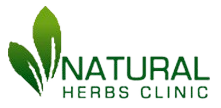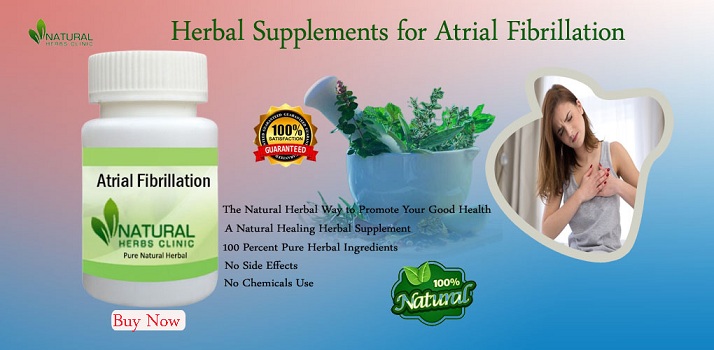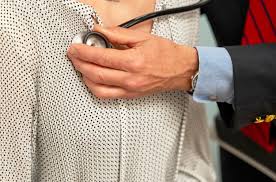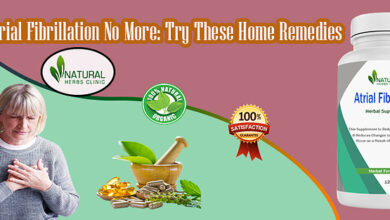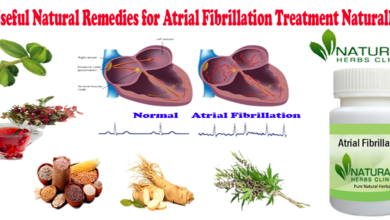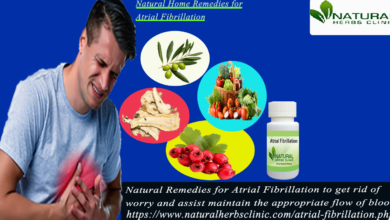Atrial Fibrillation Herbal Supplements, Authentic Way to Fight Heart Issues
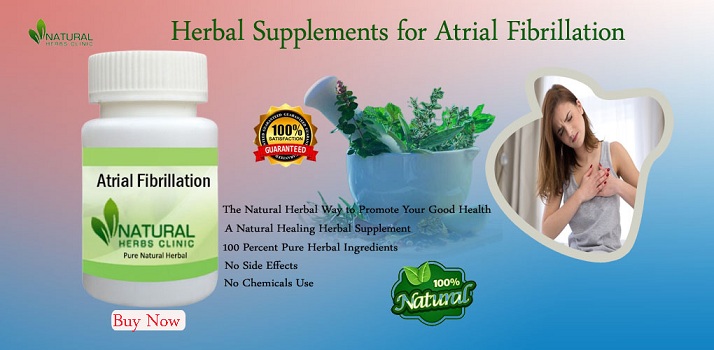
Using Herbal Supplements for Atrial Fibrillation natural recovery can be very supportive because these supplements are prepared with pure herbal ingredients that have zero side effects to use.
What is Atrial Fibrillation
Atrial fibrillation is a heart condition that makes the heart beat irregularly and frequently too quickly. When you are at rest, a typical heart rate should be steady and between 60 and 100 beats per minute. By feeling your pulse in your wrist or neck, you may determine your heart rate.
Symptoms
Atrial fibrillation (A-fib) might cause some persons to experience no symptoms at all. Those who do experience the signs and symptoms of atrial fibrillation may experience:
the feeling of a beating, fluttering, or rapid heartbeat (palpitations)
chest pain
Dizziness
Fatigue
Lightheartedness
decreased capacity for exercise
breathing difficulty
Weakness
Causes
Knowing how the heart generally beats may be useful in understanding the causes of A-fib.
Two upper chambers (atria) and two lower chambers make up the average heart’s four chambers (ventricles). The sinus node is a collection of cells found in the right atrium, the upper right chamber of the heart. The natural pacemaker of the heart is the sinus node. Each heartbeat’s signal is generated by it. Complications
A hazardous side effect of atrial fibrillation that can result in stroke is blood clots.
Blood can build up and form clots in the upper chambers of the heart (atria) as a result of the irregular heart rhythm in atrial fibrillation. A stroke can be brought on by a blood clot in the left atrium of the heart that escapes and travels to the brain.
Home Remedies Herbal Supplements and for Atrial Fibrillation
Depending on a variety of variables, including the severity of your symptoms, the origin, and duration of your atrial fibrillation, and whether you have any underlying medical conditions, the treatment for atrial fibrillation varies from person to person. However, the main goal of herbal supplements and at-home remedies for atrial fibrillation is to:
Antioxidants and Vitamins
Suppression of oxidative stress, which is thought to be a pathogenetic factor in AF, may lessen arrhythmogenesis. For the treatment of AF, a variety of antioxidants including vitamins C and E and N-acetylcysteine have been tested (29). Vitamins C and E may reduce the chance of getting AF after heart surgery, according to a few studies (30-33). A few studies have also revealed that low vitamin E levels were an independent predictor of recurrence of AF and that vitamin C supplementation reduces the recurrence of AF following cardioversion (34,35). Since N-acetylcysteine is a free radical scavenger, it has been shown to be effective in reducing AF following cardiac surgery. By adding this substance, the prevalence of AF was reduced by 36–38 percent (36,37). In animal models, the ability of antioxidants to prevent AF is being investigated. These include probucol, xanthine oxidase inhibitors, nitric oxide donors, and NADPH inhibitors (38-41). Initial trials testing the efficacy of these medicines produced conflicting findings, and more research is required before recommending them for the treatment of AF.
Ginger
Natural Remedies for Atrial Fibrillation include ginger as a beneficial herbal component. It has powerful anti-inflammatory ingredients like zingerone and gingerol. For natural treatment of atrial fibrillation, take 1 gram daily.
Barberry
Barberry It is a shrub with 500 or more species that is a member of the Berberidaceae family. This is a tiny shrub that is frequently found in Southeast Asia, Central and Southern Europe, and the Northeastern United States (42). For the past 2,500 years, extracts from this plant’s fruits and roots have been employed in Ayurveda and Chinese medicine (43). Berberine is the name of the extracted active alkaloid, which is thought to offer a number of therapeutic benefits. Barberry is one of the useful herbal ingredients contained in Herbal Products for Atrial Fibrillation that are very helpful to provide some relaxation to the heart condition.
Cinchona
This plant is a member of the Rubiaceae family. Several alkaloids, including quinine, quinidine, cinchonine, and cinchonidine, are present in the plant’s bark. Quinine is used to treat AF and other cardiac arrhythmias, while the active element in quinine is used to treat malaria and night cramps. Quinidine is a Class IA antiarrhythmic drug that inhibits the sodium and potassium channels to produce its anti-arrhythmic effects (52). Additionally, it has alpha-receptor blocking qualities and also reduces vagal output (52). Quinidine has been used to treat AF, but it has a number of negative side effects, including torsades de pointes, diarrhea, headaches, tinnitus, and thrombocytopenia (53). The use of quinidine in the treatment of AF is constrained by the aforementioned side effects and the accessibility of superior anti-arrhythmic medications. Other than the pure version of quinidine, it is unknown how cinchona affects AF. It might still have some antiarrhythmic effect, though, since quinidine is one of the active ingredients. Additionally, it might interact with other drugs. Therefore, individuals who are taking other anti-arrhythmic medications, in particular, should be advised against using cinchona extracts on a regular basis. Cinchona is one of the powerful Herbal Remedies for Atrial Fibrillation.
Hawthorn
Hawthorn, This plant’s flowers, leaves, and berries have long been used as a source of extracts for the treatment of cardiovascular diseases (54). This plant’s extracts have pharmacologically potent flavonoids and procyanidins that have a variety of effects on the cardiovascular system (55). It is thought to block the delayed and inward rectifier potassium current, extending the action potential duration and having a detrimental chronotropic effect (56). It is also thought to block the effects of beta-adrenergic substances (55). Inhibiting the activity of the enzymes phosphodiesterase and Na-K ATPase results in its positive ionotropic action (55). Hawthorn hydroalcoholic extracts have mostly been employed as Atrial Fibrillation Herbal Supplements. WS 1442 and LI 132 are the two versions of this chemical that are most frequently researched (57). Utilization of this substance improved exercise ability and also reduced heart failure patients’ mortality (58,59). It has class III anti-arrhythmic capabilities, although its use in the treatment of atrial arrhythmias has not undergone a thorough evaluation. Additionally, it prevents thromboxane A2 from being synthesized, which could boost the antithrombotic impact of antiplatelet medications and raise the risk of bleeding (60). Because of how digitalis affects P-glycoprotein function, there is some concern about interactions; nevertheless, a thorough retrospective analysis found no evidence of significant interactions with any medicines (61,62). Despite its potential advantages, there are currently no clinical studies testing its usage in the therapy of AF. Due to its propensity to inhibit thromboxane A2, patients who are concurrently utilizing antiplatelet and/or anticoagulant medications should be advised against using this preparation.
Curcumin
The energy component in turmeric called curcumin is used as one of the helpful Home Remedies for Atrial Fibrillation. When it comes to heart disease, diabetes, and other medical disorders, it can reduce inflammation. Every day, take 100–500 mg.
Herbal Supplements for Atrial Fibrillation Made by Natural Herbs Clinic
Natural Herbs Clinic is one of the best online resources where anyone can find lots of home remedies and Herbal Supplements for Atrial Fibrillation and for lots of other diseases and elements. These herbal supplements are made with pure herbal ingredients without any harmful chemicals in the instruction of experts herbalist.
